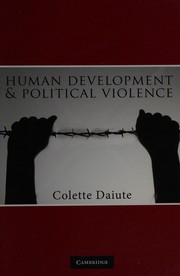
Professor of Psychology Colette Daiute is interested in “the social cognitive development of children at risk.” Her research focuses on
… children’s social conflicts, conflict resolution, children’s development in war and post-war contexts, children’s rights, literacy development, writing, and uses of interactive technology. Working from the perspective of socio-historical activity theory, Dr. Daiute is especially interested in children’s participation in social and intellectual practices as influenced by political and economic factors.
Daiutes’ research with young people “during and after political violence involves interventions with various digital technologies (among other educational and pro-social activities) for positive youth development, and the research process extensively employs digital research tools for analyzing natural communication activities during the interventions and as part of socio-political change.”
Her course “Human Development and Globalization” reviews research on the role of digital technologies in contemporary globalization processes (among other relevant globalization processes); examines digital projects supporting positive child/youth development within and across global/local contexts, as well as developmental problems exacerbated by globalization; reviews and samples digital archives and interfaces for studying the reciprocal changes of individuals and societies.
Her course “Discourse Theory and Analysis” includes theory and research on multi-media technologies related to human development, learning, and life experiences; focuses on contemporary theories of narrative and other discourse genres relevant to digital analysis (with analytic strategies beyond word searching, concordance, etc.); examines digital tools for research, such as storing data, assisting in data analysis, summarizing results, etc. including Atlas ti and NVivo, among other aspects of the course.
Discourse Theory & Analysis – syllabus
In this course, we review several contemporary theories of the role of discourse in life experience and development. We extend theoretical principles to apply strategies for designing and analyzing discourse in research, in particular, the uses of verbal and non-verbal communication to mediate individual and societal development. Focal issues in this discourse analysis process include concreteness of meaning, power relations, interactions of material and symbolic contexts, and within-person as well as cross-group diversities. Readings are drawn from the social sciences and humanities. We consider designs with naturally occurring discourses (such as narratives, conversations, and archives from fieldwork in diverse institutional and community settings) and research interventions with narratives, interviews, conversations, and digital media. With this focus on discursive meaning making, the course blurs distinctions between qualitative and quantitative methods in favor of systematic analyses to address theory-based research questions. The course involves reading, report writing, and participating in class discussions, labs applying specific analytic techniques and data analysis software. Students are invited to bring their own projects and data to the course. No prerequisite.
Colette Daiute’s research and related teaching focus on the changing nature of human development via interactions with contemporary global systems of mobility, resource distribution, and communication. Her research projects and courses consider challenges to and opportunities for child, youth, and community development, with digital technologies for interventions and research. For example, current research projects in the United States, Colombia, and the former Yugoslavia employ social media, digital archives, and multi-media production tools for purposeful communication among young people, families, and communities dealing with the effects of various forms of political violence and its consequences. The research phase employs innovative digital technologies for data storage, natural language analysis, and presentation. In my courses, we study research on the role of digital technologies related to human development in global systems, and we use various technologies in developmental research design and analysis.



